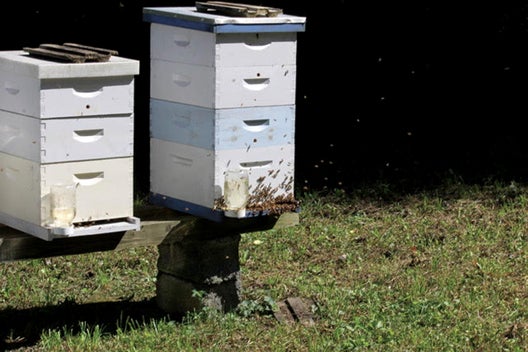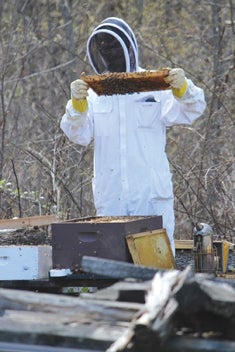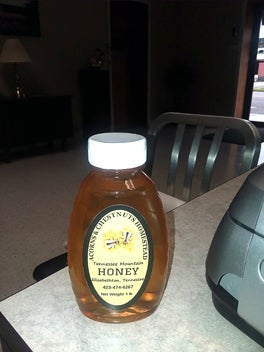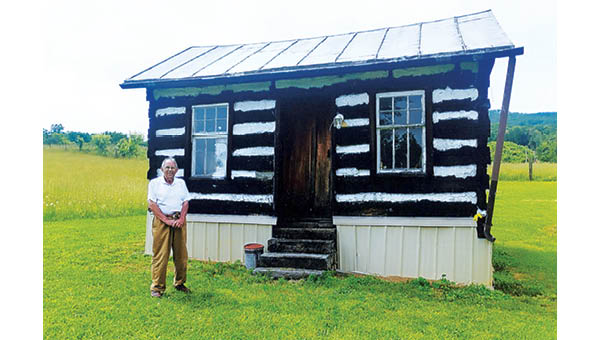Rory Beierle leads a ‘sweet’ life
Published 3:08 pm Friday, May 15, 2020





|
Getting your Trinity Audio player ready...
|
Rory Beierle lives at the head of Stoney Creek in Dry Hollow with his wife, Mary, and his 15 hives of honeybees.
Beekeeping is “sweet” work for the Beierles, who have had bees for 25 or 26 years. “We started hearing about the colony collapse disorder and my wife suggested we get some bees. For 15 years she primarily worked with the bees and when she became allergic to bee stings, I took over. It’s not something you just do, you must educate yourself about bees, how to attract them, and have the time to fool with them. It takes a significant amount of time to assemble and repair hives, put out swarm traps, etc. It’s definitely more work than the average person thinks,” said Rory.
He also noted that there is work to keeping the bees healthy, protecting them from mites and disease. “You have to know your bees well enough to detect when there is a problem,” he shared.
Rory harvests honey twice a year — usually in the spring around the end of May and again around late August or early September.
Last year, Rory and Mary harvested around 286 pounds of honey, which they sell locally to neighbors and friends. “A lot of it we give as gifts,” he said.
Rory has had as many as 31 working hives, but feels more comfortable with half that many. His hives are kept in an upper field near his home. Each spring he puts out swarm traps in different locations to attract the bees. “If I’m lucky to attract a swarm of wild bees, I bring them back to my property. Typically, bees swarm in the spring when a hive is becoming overcrowded.”
Rory says his bees usually feed in the spring off the nectar from Witch Hazel, wild cherries, locust, tulip poplar, and fruit trees. “In the summer they go after clover, and in the fall, they go back to the mountains to feed on sourwoods and in fields of goldenrod. Also, this time of year they like blackberries,” he said.
“The bees are interesting little creatures. They are smart, and if you are around them very much, you can learn from them. Like people, they have bad days and good days. On their bad days, you don’t want any part of them. They work as a society. Bees have a highly structured community life and they each have a job, and are constant workers,” Rory explained.
Honey is just one product of honeybees. Worker honeybees also produce beeswax, which is formed into honeycombs and become the structure of their home. It also is used in candle making as well as other products.
When describing his work with the bees, Rory said beehives are bottomless boxes which hold wooden frames upon which the bees build their combs. “There is so much involved in keeping bees and building hives which protect the bees and lend to building honeycombs which allow access to the worker bees and protection for the Queen Bee,” he said. “The work of the honeybee is very intricate.”
When it comes time to rob the hives of their honey, Rory dons his protective white suit, veil and hat, which prevents stings to the face, and his elbow-length gloves to keep the bees away from the hands and out of sleeves. The honey is then pulled from the frames, strained and filtered before it is bottled or put into jars for keeping.
Also, Rory explained that you want to leave some of the honey inside the frames for the bees to live on until new supplies become available.
Rory and Mary bottle their honey under the name “Acorns and Chestnuts.”
“My wife came up with that name because of the many oak and chestnut trees which grow on our property and around us,” said Rory.
In addition to their beehives, Roy and Mary grow their own vegetables, and Rory at one time bought old barns and razed them for the lumber, much of which was wormy chestnut. Occasionally, he dresses up as Abe Lincoln and shares with school children and civic groups. And, he is an Abe Lincoln look-alike with his tall, lanky features and chin beard.
Rory and Mary moved here from Florida basically to get away from urban living. In addition to living and working with the bees, gardening, and other things, such as mowing and keeping up his property, Rory spends quite a bit of time caring for his elderly mother, Gwendolyn Hartman, who also lives in Elizabethton.
Beekeeping is both a hobby and chore for Rory Beierle. “Like anything else, beekeeping requires time and commitment if you want to be successful. The more effort you put into bees, the more you’ll get out of them. Investing in the time to learn how to effectively care for bees can dramatically increase honey production for that year. Bees are self-sufficient, but you can invest as much time in them as you want,” he said.










